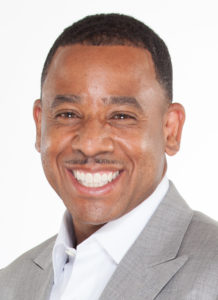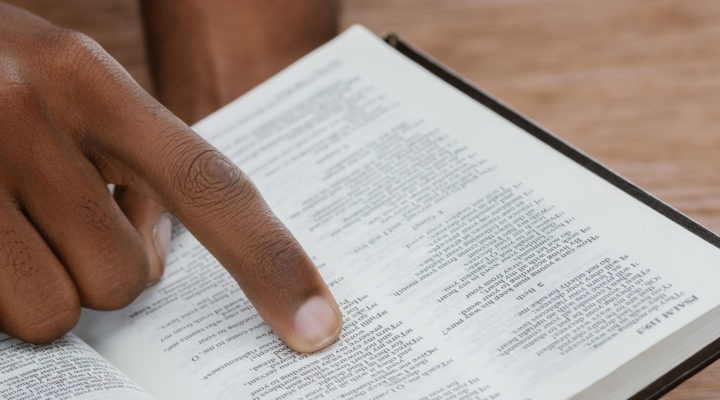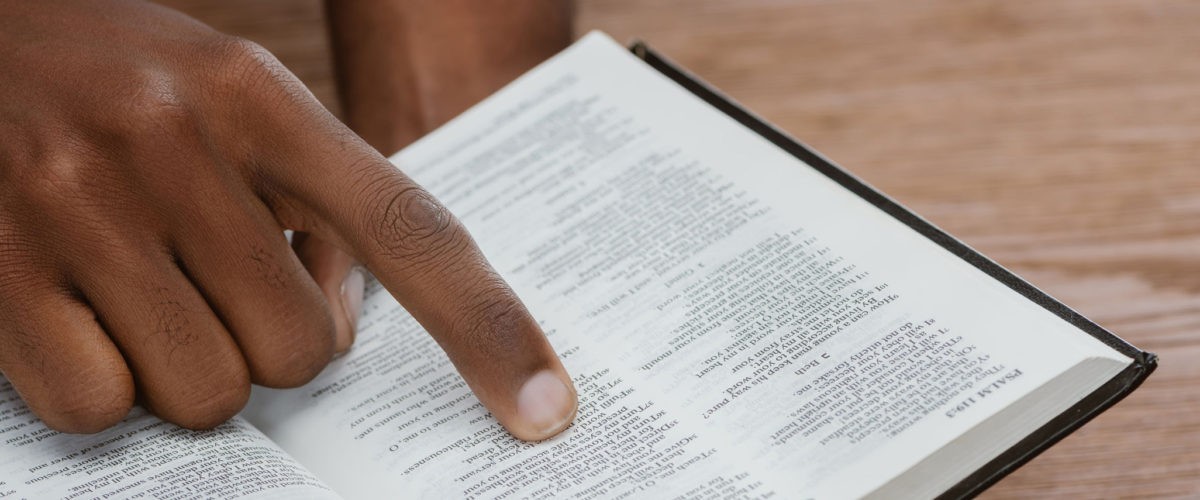On April 12, 1963, Martin Luther King Jr. was arrested in Birmingham, Ala., for leading a nonviolent demonstration for human rights. While he was being detained, he was given a newspaper that contained a statement written by eight white preachers.
The statement was titled a “A Call for Unity,” and it was a critique of King’s leadership of sit-ins and marches and demonstrations in pursuit of civil rights. The statement celebrated the response of Birmingham law enforcement for being enforcers and keepers of the peace.

Dexter Nutall
In response to their statement, King composed what we know today as “Letter from Birmingham Jail.” In it, he reminded his accusers of the obligation of a prophet to speak truth to power, to seek justice on behalf of the oppressed, and of their complicity in creating the circumstances that gave rise to the demonstrations by their deafening silence and absence.
Now, I am no Martin Luther King Jr. But I am called by the same God, redeemed by the same Christ, and committed to the same cause of justice, as should be every person who claims to be a follower of Jesus. The truth is that I am burdened by the spiritual condition of this country. I am grieved at the manipulation of the faith this nation claims to be built upon and how it has been compromised and prostituted without any response from those who have lent their pulpits and platforms to shameless race bating and provocative rhetoric.
Quite frankly I’m tired of people — especially those who are connected to the church — acting as if there is no race problem in America. So today, I am compelled to take a different approach. I’ve written a letter to the church — the universal church and specifically the white church.
Dear Brothers and Sisters in Christ:
I greet you in the name of the one who is an advocate, mediator, liberator and friend of all who call him Christ. I write because I am a member of the body of Christ who happens to be a Black man. I identify myself this way because I am constantly reminded of both realities, however the latter in not so pleasant ways.
I am clear and confident that I and others who look like me are made in the image of God, as you should be as well. Thus, my skin color should not matter. But recent events are painful reminders that skin color does matter in this country — even to those who claim to be part of the same body. So, I come in love because that is the heart and manner of Christ, but with concern for the condition and future of the church.
“Recent events are painful reminders that skin color does matter in this country — even to those who claim to be part of the same body.”
I do not need to remind you of recent events. Once again, we have been confronted with the loss of Black and brown lives in multiples. So we find ourselves at a moment where again the original sin of this country is wreaking havoc in the public square. It would be bad enough if it were only in the public square. But circumstances suggest it is also in board rooms, in town and community halls, and even in churches.
White supremacy and racism are infused into the soil of America, and they continue to produce weeds resulting in brutality to Black and brown bodies and inequities too numerous to mention.
I must remind you that this is nothing new. History reveals that it was white Christians, some of whom are exalted as founding fathers of the nation, who led the charge in using Christianity to strip an entire people of their culture, humanity and dignity.
We realize this narrative is not one of the past when we consider statistics of those most impacted by the COVID-19 pandemic, the fact that one out of every three Black men will be incarcerated for some period of time in their lives, and the fact that communities of color receive the most inadequate educational resources. The list of disparate treatment is endless.
But most concerning is the fact that much of the debate about whether systemic racism even exists is taking place among those who claim allegiance to the same God. I suggest that part of this disconnect is a lack of understanding for how a racialized society forms the way we see the world and how we see one another. The very fact that we refer to one another based on skin color at minimum means we live in a racialized society. Therefore, race has a formative effect.
While I do not doubt that most who say they are not racist mean well and have no malice of heart, there is a blindness to certain factors that make us ready to invoke double standards and cause us to think what we think and feel what we feel. The tragedy is that this blindness even impacts our understanding of who Jesus is and the gospel he represents.
I do not write to make a political statement. No political party has a patent on racism. I write to make a gospel statement in hopes of providing a foundation for engagement and action to move the church toward the kind of environment that God can use to ignite revival.
To my white brothers and sisters, here is what I would like you to know:
First, it is offensive when you tell us you do not see color. The narrative of American culture is that whoever has the power makes the rules. Moreover, my observation is that whoever makes the rules makes them to favor themselves.
“There never has been a time in this county where whiteness has been disconnected from power.”
The fact is there never has been a time in this county where whiteness has been disconnected from power. Therefore, if you are white, you are afforded certain privileges and presumptions based strictly on the color of your skin. You can be white and have no regard or concern for basic considerations of life. This, my friends, is the definition of white privilege.
Meanwhile, people of color do not have the luxury of assuming they will walk away from the next inquiry from those who are supposed to protect them. Not even basic assumptions of life, safety or well-being can be made by people of color.
So, when you tell us you do not see color, you tell us that we do not matter.
The book of Revelation declares that people from every nation and all tribes and all languages will surround the altar of God to give unified worship, no worship being more valuable or significant than any other. Because God sees color as an expression of diversity and a unique expression of the image of God.
Second, love of God and love of country are not the same. In fact, love of country at the expense of love for your neighbor, as Jesus commands, is idolatry. People of color have fought, bled and died for this country, but we are treated differently on our own soil.
This is why I am confused by those who have such tension with even the sentiment that Black lives matter. You do not have to agree with an organization or a movement to affirm the humanity of Black and brown bodies. This is why people of color are angry and frustrated and tired. There can be no love without accountability, and there can be no relationship without mutual commitment — even when there is a cost to be paid for it.
“Elevation of your nation to the height of God is sin.”
Elevation of your nation to the height of God is sin. It is even more shameful when such idolatry is at expense of another life. You cannot serve two masters. You must choose which master you serve.
Third, there is no justice without sacrifice. The Bible declares that everything is purified with blood. Without the shedding of blood there is no forgiveness of sin. Jesus pays the ultimate price and penalty for our sins with his own blood so that those who confess him can have restored relationship with God. That is what justice does. Justice restores relationship with God.
Justice, then, is relational and it requires that a price be paid. Moreover, God gives to us the ministry of reconciliation in order that we might be reconciled to one another.
I suggest, then, that racial reconciliation requires that a price be paid, and that it be paid by the one who holds the power. That means that your cognitive support of justice is not enough. As faith without works is dead, so are empty statements, texts, tweets and prayers that are not followed by feet on pavement, voices holding governments accountable, and reallocation of resources and power to make right what always has been wrong in this country.
To my brothers and sisters whose skin has been kissed by the sun:
First, understand that we are in a spiritual fight. A Catholic priest by the name of Pierre Teilhard de Chardin once described the dichotomy of life as best as I’ve heard it explained. He said: “We are not human beings in search of a spiritual experience. We are spiritual beings immersed in a human experience.”
It is human nature to emphasize our sensory experience. Yes, racism is real. Yes, racism is systemic. Yes, racism is sin. White supremacy is no less real and sinful. They are demonic forces that express themselves in very real ways through people. But Paul is right when he reminds us that our battle is not against flesh and blood enemies but against principalities and evil in an unseen world.
Friends, that is good news because as heirs of the most high God, we have access to resources and power that are greater than the enemy, and our battle is not ours. “Some trust in chariots and some in horses, but we trust in the name of the Lord our God.”
Second, I don’t have to remind you that we are descendants of people for whom life, liberty and the pursuit of happiness is still a fairy tale. We are inhabitants of a country that has made us promises yet unfulfilled. As King stated, America has given the Negro people a bad check that still has not been satisfied. We still bear the consequences of promises unfulfilled.
“We stand on the shoulders of those who prayed and trusted God when nothing they saw suggested they should.”
But we also are the descendants of people who sang songs in the night. We stand on the shoulders of those who prayed and trusted God when nothing they saw suggested they should. The good news is that the God of yesterday is the God of today and will be the God of tomorrow.
And the same God who kept his people while enslaved in Egypt and parted the Red Sea to make way for their escape, the same God who made a promise to God’s people and ushered them into the land of the promise, the same God who emboldened God’s people as they marched and protested and boycotted is the God who loves the oppressed and comforts the poor in spirit, who comforts those who mourn and blesses those who hunger and thirst for righteousness. This God hears our prayers and fights for us.
So where does this leave us? Again, I confess that I have no answers, only lots of questions. But I am certain that there is no authority greater than our God and no power that matches the unified body of our Lord Jesus Christ.
Allow me to make a few suggestions for what will be necessary to give visible witness to the power and presence of God as we make our way through this storm:
Repentance. The history of race relations in America is deep and painful. The wounds of racism in this country will not heal without acknowledgement of that history, the pain it has caused, and the realities it has created even up to this very moment. There can be no healing without repentance.
Repentance requires confession and movement in the exact opposite direction. The history of racism and discrimination demands intentional lament that creates space for the internalization of the stories of a people whose blood has been shed at the hands of those who were white.
“Why are we unable to just move forward? Because history is not so forgiving as to divorce itself from implications in the present.”
Why are we unable to just move forward? Because history is not so forgiving as to divorce itself from implications in the present. There are generations of people who have benefited and continue to benefit from slavery and racism. Likewise, there are generations of people of color who suffer trauma from the images and stories of beatings, lynchings, rapes and family separations over and over and over again. There can be no reconciliation under such circumstances without humble repentance and redress.
Redistribution. The benefits that have inured in favor of the majority race in this country at the expense of people of color cannot be quantified. But these benefits reveal themselves in the form of economic opportunity or the lack thereof. The Bible is clear about the obligation to make whole those who have been exploited for the sake of another.
My point here is simply to suggest that those who are serious about being bridge builders and repairing the race relations might consider committing yourself to some form of resource redistribution that makes a difference in the life of a Christian community of color. We appreciate your prayers and sentiments and ask that you speak and influence your community at every opportunity.
But prayers, calls and tweets are not enough. Reallocate your resources. Create seats at tables and places on platforms so the body can enjoy the breadth of experience and perspective within the body of Christ. Use your influence to create space and partner with those who do not look like you.
Relocation. Those who best know how to heal hurts are those who have been its victims. In the face of the winds of systemic challenges and opposition emerged one of the greatest gifts God has given to the world in the Black church. The Black church personifies the meaning of leadership and infinite grace even in persecution.
“The Black church personifies the meaning of leadership and infinite grace even in persecution.”
Perhaps, the entire body of Christ would be served if those who enjoy the presumptions of power and privilege were to remove themselves from comfortable spaces of entitlement and commit to learning from leaders of color. If nothing else, you will experience the feeling of being the minority rather than the one who holds power. But more importantly, I suspect you will actually hear stories and perspectives you have not heard before because you never have had to listen.
As I stated at the outset, I have far more questions than answers. However, I am clear that the bride of Christ has a decision to make. We can humble ourselves to the Spirit of God, the work and the ways of Jesus, and experience the kingdom of God on Earth, or we can disregard our obligations to one another for the sake of maintaining power, privilege and preference.
What I know is this: This is the moment. How we respond to this moment will define how the world views the witness of Jesus Christ and his church for generations to come.
The disease of racism cannot be treated without consistency and commitment from those who have the heart of Christ. God is ready, willing and able if we are. I pray for conviction that provokes us to action in order that unity can be born in a way that allows the seeds of hope and healing to yield a harvest of righteousness and justice.
Dexter U. Nutall serves as senior pastor of New Bethel Baptist Church in Washington, D.C. He earned a bachelor’s degree in psychology from Mount St. Mary’s University, a J.D. from Howard University School of Law, a master of divinity degree from Samuel D. Proctor School of Theology at Virginia Union University, and is a doctor of ministry candidate at Fuller Seminary. He is the visionary for DUN Ministries and its subsidiary Project Impact Group, an online group of leaders from across the country. The group hosts an open virtual prayer gathering of hundreds daily and supports development and opportunities for Christian leaders and organizations in the marketplace.
Related articles:
Virginia pastor offers help for churches that don’t want to talk about racism
USC study finds Blacks three times more likely to be stopped by police in LA County
‘Southern pride’ or racism? White Christians are compelled to discern the difference. And confess.
Could you win a quiz show by defining ‘Critical Race Theory’?
America needs a ‘third Reconstruction,’ Barber tells new administration


